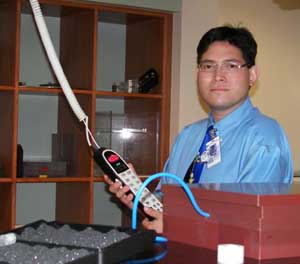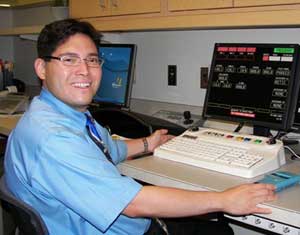Albin Gonzalez
Medical physics is not a well-known field, but it's an extremely important one, says medical physicist Albin Gonzalez. As chief medical physicist at the Firelands Cancer Center in Sandusky , Ohio , Gonzalez works with a team that is responsible for patient treatment and safety. Every day, Gonzalez applies his knowledge of physics, biology, medicine, and computer technology to give patients the best possible treatment.
Gonzalez works with high-tech machines, commercial versions of the same type of accelerators used in cutting-edge science. His clinic recently moved to a new building and bought two new linear accelerators “with all the bells and whistles,” he says.


With the rapid improvement in cancer treatment, Gonzalez is constantly learning new technology. “We are actually implementing new technology to do new type of treatments,” he says. Physicists have been responsible for many of the improvements in cancer treatment, Gonzalez says. For instance, just a few years ago, people who had some types of cancer were treated with large beams of radiation that damaged healthy cells. But now, a new type of treatment called intensity modulated radiation therapy allows doctors to shape the beam more precisely, so the beam hits only tumor cells and avoids harming healthy tissue. “And all this improvement has been done by physicists. Physicists have been the champions of bringing a lot of new technology,” says Gonzalez.
Like many medical physicists, Gonzalez has a PhD in physics. Originally from Panama , Gonzalez came to the United States to pursue an advanced degree in physics at Vanderbilt University in Nashville , Tennessee . While searching for a topic for his PhD thesis, he happened to find a research group that was working in medical physics. That subject caught his interest, and he decided to join the group. He soon realized he wanted to do more than just academic research, he wanted to directly affect patient care by working in a clinical setting.
Gonzalez has been doing that for several years now, working “in the trenches” he says, at the Firelands Cancer Center . He is certified by the American Board of Radiology.
Gonzalez collaborates with a team that includes the radiation oncologist, radiation therapists , and a dosimetrist, who calculates the dose of radiation for each patient. Gonzalez enjoys working with this group of people. “It's a wide environment,” he says.
On a typical day, Gonzalez and his coworkers must check patient charts and review treatment plans. Gonzalez must also check the equipment. He describes a lot of his work as “quality assurance.” He uses detectors to make measurements to check that the machines are delivering the right doses of radiation. He also has to check several computers that control the treatment, and make sure all these computers are working together properly.
Most of the time, Gonzalez does not work directly with patients, but occasionally he is called upon to talk with them. For instance, some patients receiving some types of radiation therapy worry that they are radioactive and dangerous to their family if they go home. Gonzalez explains the physics involved in the treatment, and assures them that from a radiation safety standpoint that they are quite safe.
Gonzalez likes the challenge of solving new problems every day. Sometimes the technology is so new that it's not known how best to use it, and there is often trouble with the equipment. Gonzalez has to understand the principles of how the treatments work so he can find and solve the problems. That's where his physics training is useful. “I think the most important thing is that as a physicist, you have problem-solving skills,” he says. In the clinical setting, it's extremely important that everything work correctly, because people's lives and health are at stake. “This is actually taking care of real people. You cannot put people in danger,” he says.
Gonzalez wishes people knew more about medical physics. “There is a lot of need. There are a lot of jobs out there,” he says. Being able to help patients is one of the biggest rewards of the job, he says. “We can make a real difference treating cancer patients. The more we know about this disease and how to treat it safely, the better quality of life we can give these people.”











